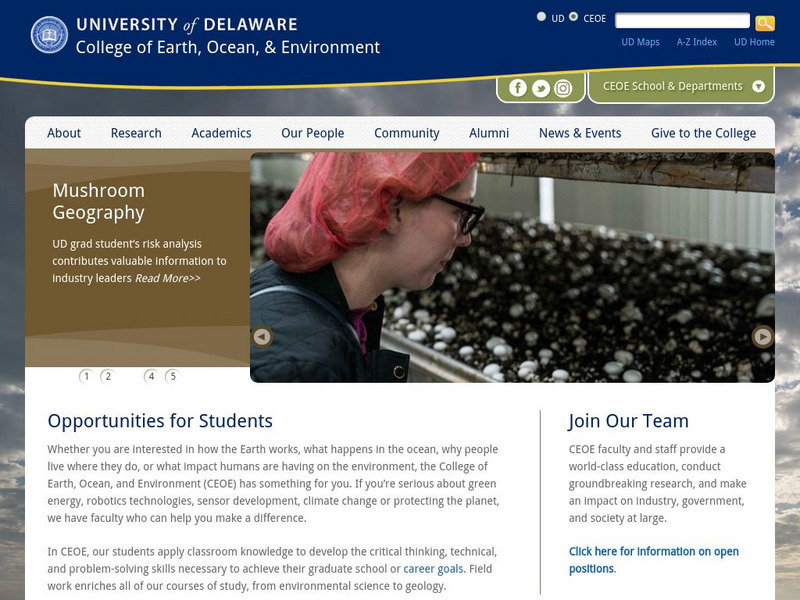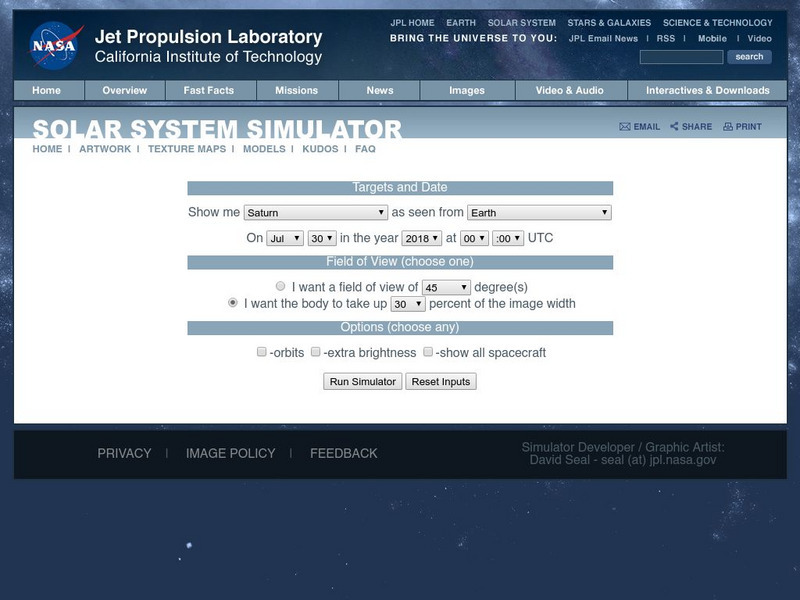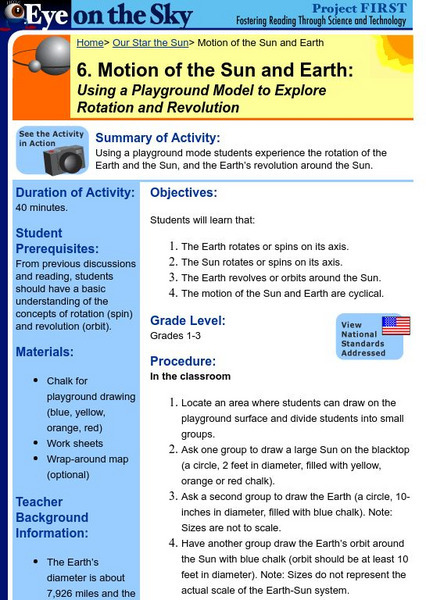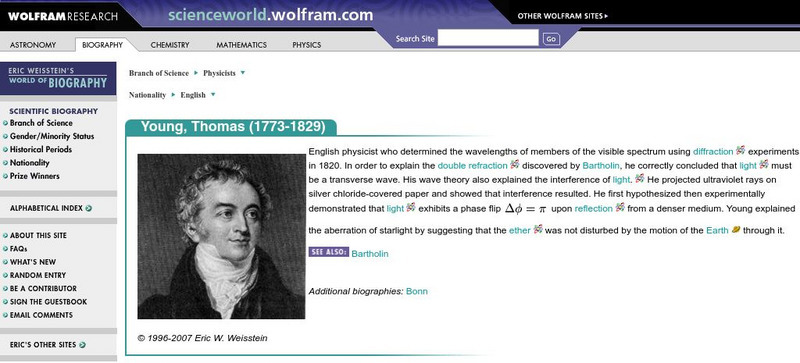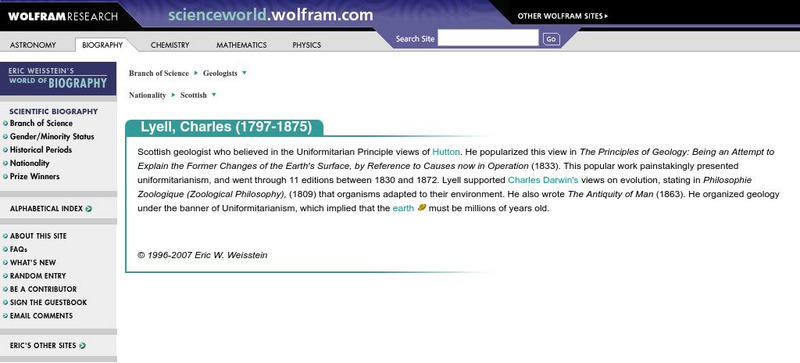Other
University of Delaware: Plate Tectonics
This site is a very simple overview of plate tectonics. It includes a map of all the major plates and a diagram of the layers of the earth.
NASA
Nasa: Surface Maps of the Solar System
Solar system surface map database. Includes maps of all solid planets and many moons. Maps of gas planets are either based on images taken by Voyager, or are fictitious maps including general storm systems.
NASA
Nasa: Welcome to the Planets Earth
Images of specific locations on the surface of the Earth, taken from space, along with descriptive captions.
NASA
Nasa: Planetary Photojournal: Earth
This site provides access to publicly released images of the planet Earth from various Solar System exploration programs.
NASA
Nasa: The Galileo Mission
This site from NASA has information on the Galileo space mission, which launched in October 1989. In spite of technical problems, Galileo transmitted enormous amounts of new data, especially about Jupiter and its satellites and rings,...
Ducksters
Ducksters: Earth Science for Kids: Plate Tectonics
This site helps students learn about the Earth science subject of plate tectonics including major and minor plates, convergent, divergent, and transform boundaries.
Ducksters
Ducksters: Earth Science for Kids: Forest Fires
Gather information about forest fires including major human and natural causes, how they spread, firefighters, campfire safety, fun facts, and good wildfires on this site.
Ducksters
Ducksters: Astronomy for Kids: The Planet Earth
This site is astronomy for kids and teachers! Here students can learn about the planet Earth of the Solar System including fun facts, mass, day, year, and distance from the Sun.
Ducksters
Ducksters: Earth Science for Kids: Geology Glossary and Terms
Find a glossary and terms of geology in the Earth sciences on this website. This site contains definitions for words such as erosion, fossil, glacier, rocks, minerals, mantle, and topography.
Other
Buzzle.com: Univer Savvy: Which Is Bigger the Earth or Sun?
Find out what the diameter and volume of the Earth and the Sun are and learn just how much bigger the Sun is. Also explains how the Sun compares to the Moon.
Ducksters
Ducksters: Earth Science for Kids: Weather: Wind
Kids learn about wind including how it is formed, how it is measured, local and global winds including prevailing, westerlies, trade, and polar easterlies.
Ducksters
Ducksters: Earth Science for Kids: Soil
Kids learn about the Earth science subject of soil including how it is formed, properties, horizons, layers, topsoil, bedrock, and facts about soil.
Science4Fun
Science4 Fun: Earth
Learn fun facts and details about the geography and composition of Earth, the third closest planet to the sun and the only planet that contains life.
Other
Center for Science Education: Eye on the Sky: Motion of the Sun and Earth
Students model the interaction of the earth and the sun. The activity is designed for the playground. You will need chalk, but all the other worksheets are provided.
Mocomi & Anibrain Digital Technologies
Mocomi: Hemispheres of the Earth
Explains the Earth's hemisphere, the climate in them, and other interesting facts.
NASA
Nasa Space Place: All About Earth
Brief description of the earth's structure, surface, neighbors, and history with images.
NASA
Nasa Space Place: Do a Science Fair Project!
Your science fair project may do one of three things: test an idea (hypothesis), answer a question, and/or show how nature works. Learn the steps involved in a project and get some great topic ideas.
Wolfram Research
Wolfram Science World: Young, Thomas
This site from ScienceWorld provides a very short but factual biographical sketch of Thomas Young (1773-1829 CE) and describes his most notable scientific discoveries and contributions. Links are also provided throughout for additional...
Other
Unep/siem D2 Weather
This site offers information on the effects of weather on islands. There is some mention of sea breezes.
Other
Pole Shift Forum: Polar Wandering
Based on paleoclimatic and paleomagnetic evidence, to geologists, the words 'polar wandering' have two distinctly different meanings.
Quia
Quia: Brushing Your Teeth
This site gives you opportunities to practice putting the planets in the correct order from the sun. Press "Click here to begin" to get started.
Wolfram Research
Wolfram Science World: Charles Lyell
This site from ScienceWorld describes the Scottish geologist Charles Lyell who supported the ideas of the uniformitarian principle and aligned himself with James Hutton's ideas. He also supported and refuted some of the ideas of Charles...
NASA
Nasa: The Rocket Motor
An online version of a book pertaining to task of launching rockets into space and subsequently navigating them through space. The first several "chapters" (pages) describe the influence of gravity on Earth and the barriers which it...
Curated OER
Earth Man Teaches Planet Earth
Read interesting facts about the Earth on this fun, easy-to-read site.


